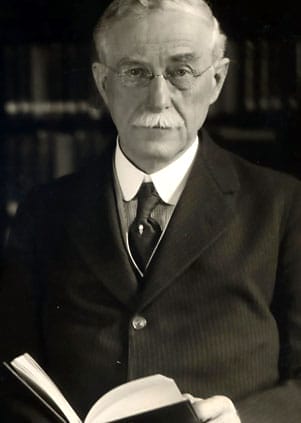 Emory Johnson was Wharton’s first specialized business professor who not only pioneered U.S. transportation studies but practiced in the field. His work built the foundation for the consolidation of U.S. railways, and it was Johnson who set the tolls for the brand new Panama Canal. While previous professors had taught a general management curriculum, Johnson focused on commerce and transportation beginning in 1894.
Emory Johnson was Wharton’s first specialized business professor who not only pioneered U.S. transportation studies but practiced in the field. His work built the foundation for the consolidation of U.S. railways, and it was Johnson who set the tolls for the brand new Panama Canal. While previous professors had taught a general management curriculum, Johnson focused on commerce and transportation beginning in 1894.
As Wharton developed its first four-year curriculum, Johnson was determined to create those business specialties—the first ever offered on the university level, and a hallmark of Wharton’s curriculum today. Responsible for instruction in geography, commerce, and transportation, Johnson in 1903 began to author texts on transportation, including the landmark American Railway System, the first such volumes in the field, as his doctoral students focused on geography and commerce. Some of his students became well-known scholars in their chosen fields, including future insurance giant Solomon Huebner (also featured in this issue).
An early member of the U.S. Isthmian Canal Commission charged with building a canal to shorten shipping routes from East to West, Johnson was renowned for his transportation expertise. In 1911 he was called to the Panama Canal to develop tolls. These fees were to be paid by ships to use the Canal, according to Johnson’s scale, taking into account cargo volume and ship measurements.
In 1913 he became Pennsylvania’s state regulator of railroads. He next served as primary architect of national transportation policy as a member of the Executive Committee of the Chamber of Commerce’s National Transportation Conference. He helped develop a cohesive regulatory vehicle for the transportation industry that became the far-reaching Transportation Act of 1920, which directed the Interstate Commerce Commission to consolidate U.S. railway properties. Johnson died in 1950.


























